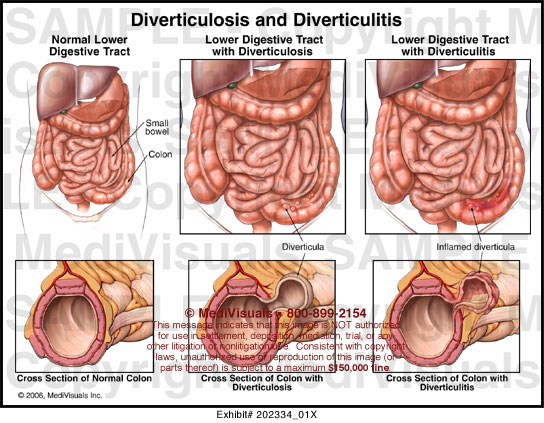Debunking Diverticulitis: Discovering Natural Remedies and Uncovering Causes
Diverticulitis and diverticulosis are two digestive conditions that affect many individuals worldwide. Both conditions primarily occur in the large intestine and are closely related. Diverticulosis is the formation of small pouches, known as diverticula, in the lining of the colon. These pouches can develop over time due to a variety of factors, such as a low-fiber diet and increased pressure within the colon. When these diverticula become inflamed or infected, it leads to diverticulitis.
Understanding the causes and discovering natural remedies for diverticulitis is crucial for anyone affected by this condition. While the exact cause of diverticulosis is still not fully understood, it is believed that a lack of dietary fiber plays a significant role. When we consume a diet low in fiber, it can lead to constipation and increased pressure in the colon, making it more likely for diverticula to form.
Diverticulitis, on the other hand, occurs when these diverticula become blocked with waste material, leading to inflammation and potentially infection. Other potential causes include a lack of physical activity, obesity, smoking, and certain medications.
However, the good news is that there are natural remedies available that can help prevent and manage diverticulitis. Adjusting your diet to include more fiber-rich foods, such as fruits, vegetables, and whole grains, can alleviate symptoms and promote healthy digestion. Additionally, staying well-hydrated and engaging in regular physical activity can help maintain a healthy digestive system.
In this article, we will delve deeper into the causes of diverticulitis and diverticulosis while exploring natural remedies that can aid in managing and preventing these conditions. By debunking common misconceptions and shedding light on effective strategies, we aim to empower individuals to take control of their digestive health and lead a more comfortable life.
Causes of Diverticulitis
Diverticulitis, a condition characterized by inflamed pouches in the digestive tract called diverticula, can be caused by a combination of factors. While the exact cause is not always clear, certain factors have been associated with the development of diverticulitis.
One of the main causes is thought to be a low-fiber diet. Consuming a diet lacking in fiber can lead to constipation, which increases pressure within the colon. The increased pressure can weaken the colon walls over time, making them susceptible to the formation of diverticula.
Another possible cause is age. Diverticulitis is more commonly seen in older adults, particularly those over the age of 50. The reason behind this association is still not fully understood, but it suggests that age may contribute to the weakening of the colon walls.
Genetics may also play a role in the development of diverticulitis. treat diverticulitis have shown that individuals with a family history of the condition have a higher risk of developing it themselves. While the exact genetic mechanisms are not yet known, this association supports the influence of genetic factors.
In conclusion, a low-fiber diet, advancing age, and genetics are believed to be common causes of diverticulitis. By understanding and addressing these factors, individuals may be able to reduce their risk of developing this painful condition.
Natural Remedies for Diverticulitis

-
Healthy Diet: Eating a nutrient-rich diet is essential for managing diverticulitis naturally. Focus on consuming high-fiber foods like fruits, vegetables, whole grains, and legumes. These foods aid in smooth digestion and prevent constipation, which can worsen diverticulitis symptoms. Additionally, drinking plenty of water helps maintain proper hydration and aids in bowel movements.
-
Regular Exercise: Engaging in regular physical activity is crucial for promoting overall digestive health. Exercise assists in stimulating bowel movements, reducing inflammation, and strengthening the abdominal muscles. Incorporate activities like walking, swimming, or yoga into your daily routine to improve the symptoms of diverticulitis.
-
Stress Management: Stress can aggravate diverticulitis symptoms, so it is important to find effective ways to manage stress. Engaging in activities such as meditation, deep breathing exercises, or practicing mindfulness can help reduce stress levels and promote relaxation. Additionally, finding time for hobbies or engaging in activities that bring joy can also have a positive impact on overall well-being and help alleviate symptoms.
Remember, while these natural remedies can be beneficial, they should not replace medical treatment or advice. Consulting a healthcare professional is always recommended for proper diagnosis and guidance in managing diverticulitis effectively.
Prevention and Management of Diverticulitis
In order to prevent and manage diverticulitis effectively, it is important to adopt certain lifestyle changes and incorporate natural remedies into your daily routine.
Firstly, a high-fiber diet is crucial in preventing diverticulitis. Including ample amounts of fruits, vegetables, whole grains, and legumes in your meals can help maintain regular bowel movements and prevent the formation of diverticula. Furthermore, staying hydrated by drinking an adequate amount of water throughout the day is also essential for proper digestion and bowel function.
Regular exercise is another key aspect of diverticulitis prevention and management. Engaging in physical activities such as walking, jogging, or cycling can promote healthy bowel movements and reduce the risk of diverticulitis flare-ups. Exercise also helps maintain a healthy weight, which is important as obesity has been linked to an increased risk of developing diverticulitis.
In addition to dietary and lifestyle changes, stress management plays a significant role in preventing and managing diverticulitis. Chronic stress has been associated with gastrointestinal disorders, including diverticular disease. Therefore, finding effective stress-reduction techniques such as meditation, deep breathing exercises, or engaging in hobbies can contribute to overall well-being and potentially reduce the risk of diverticulitis episodes.
By incorporating these preventive measures and natural remedies into your daily routine, you can take proactive steps towards managing and minimizing the impact of diverticulitis on your life. Always consult with a healthcare professional for personalized advice and guidance based on your specific condition and situation.